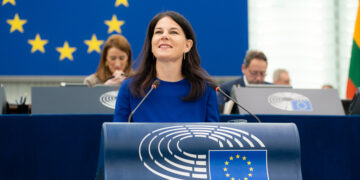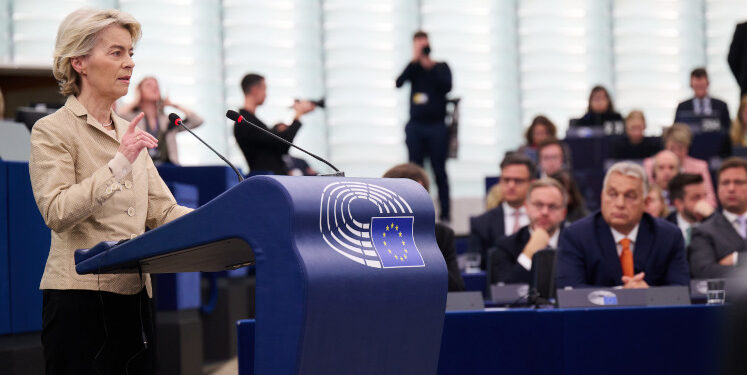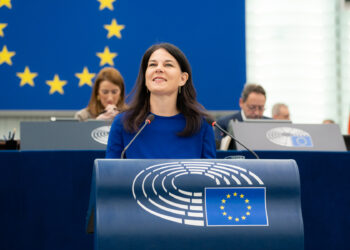The European Parliament will hold hearings for new European Commission nominees from 4-12 November. Anchrit Wille explains how the hearings have evolved since they were introduced in 1995 and what this year’s nominees can expect from the process.
The European Parliament organises hearings for all of those nominated as new European commissioners. These nominees must face parliamentary scrutiny before their appointments to the EU executive can be approved. The latest round of hearings will take place between 4 and 12 November to assess the nominees put forward following the 2024 European Parliament elections.
Unlike the veiled processes that often shape the selection of political leaders in the member states, the European Parliament has made a key part of the Commission’s appointment process more transparent. These confirmation hearings are live-streamed and draw significant media attention. They allow MEPs to examine the candidates’ integrity, skills and policy plans. Over the past 30 years, evolving practices have transformed the hearings, increasing the European Parliament’s influence over the Commission, resulting in ever-increasing scrutiny.
Pre-hearing scrutiny
Since the first hearing in 1995, the information provided to the European Parliament before the public Q&A sessions take place has become increasingly comprehensive, as shown in Table 1. In the first round of hearings 30 years ago, only the candidates’ CVs and the distribution of their portfolios were shared in advance. After the resignation of the Santer Commission in 1999, the European Parliament introduced an additional requirement: candidates had to answer a set of written questions before their hearings, providing insight into their policy approach and priorities.
Since 2004, candidates have been required to submit a declaration of financial interests, to prevent potential conflicts of interest. In 2019, this scrutiny intensified, with the European Parliament’s Legal Affairs Committee reviewing these declarations as a mandatory step before candidates could advance to the next stage of the hearing. At the very first implementation of this new procedure, the candidates from Romania and Hungary directly failed this test due to financial concerns.
Table 1: Information provided before the public hearings (1995-2019)
This increase of detailed documentation about the candidates has allowed MEPs to prepare sharper, more focused questions during the three-hour Q&A sessions, based on the evidence delivered beforehand. In response to the heightened scrutiny, candidates have started to prepare more thoroughly for their hearings, which have become a true test of their knowledge, competencies and policy plans.
Policy-oriented scrutiny
The extensive pre-hearing screening offers two key advantages. It allows MEPs to rigorously question those candidates about which they have doubts concerning their experience or past performance, while they can also focus on the future policy plans and actions of the more qualified candidates.
MEPs ask candidates to explain their vision, key priorities and how they plan to implement specific measures. Candidates must also clarify their timelines and the feasibility of their proposals. This process not only tests the candidates’ policy knowledge and communication skills but also gives MEPs the opportunity to shape the agendas of future commissioners.
Increasingly, MEPs encourage candidates to make specific promises about actions they will take once in office. For example, in 2004, the European Parliament pushed Viviane Reding during the hearings to commit to reducing data roaming charges. Creating clear lists of commitments after the hearings has become a regular practice since 2014 and MEPs view securing political promises as a key part of the questioning process.
Assessment of the candidates
After the hearings, the European Parliament evaluates each candidate based on their suitability, integrity and policy plans. Most candidates receive positive evaluations and support for their appointments. However, sometimes doubts can arise. Since 2004, the Parliament has identified 19 nominated candidates as problematic or unacceptable.
Table 2: Commissioners-Designate assessed negatively (1999-2019)
Note: The interim changes to the College also require a hearing, but these are not included in this table. The table only covers appointments at the start of the Commission’s term. A commissioner can fall into multiple categories of concerns. Members in College excludes the President of the European Commission.
Negative assessments don’t always mean a candidate will be completely blocked. Often, the European Parliament requests additional information, holds extra hearings or asks the President of the Commission to make adjustments to the portfolio distribution.
If candidates are seen as highly problematic or controversial, there may be calls for their replacement. Of the 21 candidates that the European Parliament has raised objections against in the past 30 years, seven were ultimately replaced. For instance, in 2004, the Latvian nominee, Ingrīda Ūdre, was withdrawn by her government because there were concerns about financial irregularities.
In 2009, Bulgarian nominee Rumiana Jeleva stepped aside because the European Parliament had problems with her ties to a lobbying firm and unfamiliarity with her portfolio. In 2014, Slovenian candidate Alenka Bratušek failed to convince the Parliament of her suitability after a poor performance. In 2019, France’s nominee, Sylvie Goulard, was replaced due to ethical concerns regarding her work for a US think tank.
The threat of a veto from a major political group in the Parliament is often enough for the Commission President to adjust portfolios, or for candidates to make commitments or even withdraw. Objections to candidates usually stem from concerns about their integrity and competence, such as lacking knowledge of their portfolios, giving vague answers, having potential conflicts of interest, or facing issues related to financial irregularities. Political considerations rarely lead to rejection. The only exception to this was in 2004, when the views of Italian candidate Rocco Buttiglione on women and homosexuality caused controversy.
Ever increasing control
Over the past three decades, the European Parliament has gradually increased its influence over the political direction and composition of the European Commission. This has largely been achieved by informally expanding its powers during the confirmation hearings.
Through subtle political pressure and the development of robust procedures, the Parliament has effectively gained veto power over the political appointment of the Commission. MEPs leverage these sessions to secure commitments from candidates and encourage adjustments to their plans. This process is crucial in the EU’s fragmented party system, where influencing the political agenda can be difficult.
Ultimately, this development demonstrates that, alongside the empowering of the European Parliament, there has been a strengthening of democratic control and accountability over the Commission. It can be understood as a response to the increasingly challenging political environment in which the Commission operates – one that requires this part of the executive to capably address the complex issues facing the EU.
Note: This article gives the views of the author, not the position of EUROPP – European Politics and Policy or the London School of Economics. Featured image credit: © European Union, 2024










































Discussion about this post